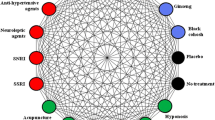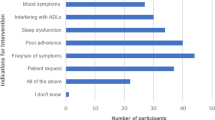Abstract
Purpose
Breast cancer affects millions of women worldwide, and for many, therapy results in treatment-induced menopause. Menopausal symptoms in breast cancer survivors are often more severe, frequent, and of greater duration compared with natural menopause. Hot flushes and night sweats pose a significant burden for many women, with limited therapeutic options as menopausal hormone therapy is contraindicated. Guidelines recommend non-hormonal pharmacological agents including clonidine, gabapentin, and some antidepressants. However, some women may be reluctant to use medications due to concerns about side effects. The aim of this narrative review was to appraise recent evidence for nonpharmacological treatments for vasomotor symptoms in breast cancer survivors including cognitive behavioural therapy, hypnosis, yoga, mindfulness, acupuncture, and lifestyle changes.
Methods
A literature search was conducted. Studies were included if they were randomised and involved breast cancer survivors and nonpharmacological treatments for menopausal vasomotor symptoms.
Results
Twelve studies met the criteria, and three studies of exercise in healthy menopausal women were included. Cognitive behavioural therapy reduces menopausal symptoms and perceived impact of hot flushes and night sweats in breast cancer survivors and is cost effective. The efficacy of hypnosis as a treatment for menopausal vasomotor symptoms in women with breast cancer is supported by two randomised controlled trials. Yoga and acupuncture may reduce vasomotor symptom frequency and/or burden. Studies of exercise as an intervention for vasomotor symptoms in healthy menopausal women have not shown benefit.
Conclusion
Evidence for nonpharmacological interventions supports cognitive behavioural therapy and hypnosis in the management of vasomotor symptoms in breast cancer survivors.
Similar content being viewed by others
Data availability
Not applicable.
References
Bray F, Ferlay J, Soerjomataram I, Siegel RL, Torre LA, Jemal A (2018) Global cancer statistics 2018: GLOBOCAN estimates of incidence and mortality worldwide for 36 cancers in 185 countries. CA-Cancer J Clin 68(6):394–424. https://doi.org/10.3322/caac.21492
Maughan KL, Lutterbie MA, Ham PS (2010) Treatment of breast cancer. Am Fam Physician 81(11):1339–1346
Odle TG (2014) Adverse effects of breast cancer treatment. Radiol Technol 85(3):297–319
Harris PF, Remington PL, Trentham-Dietz A, Allen CI, Newcomb PA (2002) Prevalence and treatment of menopausal symptoms among breast cancer survivors. J Pain Symptom Manag 23(6):501–509. https://doi.org/10.1016/S0885-3924(02)00395-0
Marsden J (2019) British Menopause Society consensus statement: the risks and benefits of HRT before and after a breast cancer diagnosis. Post Reprod Health 25(1):33–37. https://doi.org/10.1177/2053369119825716
Rosenberg SM, Partridge AH (2013) Premature menopause in young breast cancer: effects on quality of life and treatment interventions. J Thorac Dis 5 Suppl 1(Suppl 1):S55–S61. https://doi.org/10.3978/j.issn.2072-1439.2013.06.20
Hickey M, Emery LI, Gregson J, Doherty DA, Saunders CM (2010) The multidisciplinary management of menopausal symptoms after breast cancer: a unique model of care. Menopause 17(4):727–733. https://doi.org/10.1097/gme.0b013e3181d672f6
Carpenter JS, Johnson D, Wagner L, Andrykowski M (2002) Hot flashes and related outcomes in breast cancer survivors and matched comparison women. Oncol Nurs Forum 29(3):E16–E25. https://doi.org/10.1188/02.Onf.E16-e25
Nelson HD, Vesco KK, Haney E, Fu R, Nedrow A, Miller J, Nicolaidis C, Walker M, Humphrey L (2006) Nonhormonal therapies for menopausal hot flashes: systematic review and meta-analysis. JAMA 295(17):2057–2071. https://doi.org/10.1001/jama.295.17.2057
Cancer Australia (2016) Management of menopausal symptoms in women with a history of breast cancer, https://canceraustraliagovau/publications-and-resources/clinical-practice-guidelines/menopausal-guidelines. Accessed 19 February 2020
Hickey M, Szabo RA, Hunter MS (2017) Non-hormonal treatments for menopausal symptoms. BMJ 359:j5101. https://doi.org/10.1136/bmj.j5101
Stubbs C, Mattingly L, Crawford SA, Wickersham EA, Brockhaus JL, McCarthy LH (2017) Do SSRIs and SNRIs reduce the frequency and/or severity of hot flashes in menopausal women. J Okla State Med Assoc 110(5):272–274
Mao JJ, Leed R, Bowman MA, Desai K, Bramble M, Armstrong K, Barg F (2012) Acupuncture for hot flashes: decision making by breast cancer survivors. J Am Board Fam Med 25(3):323–332. https://doi.org/10.3122/jabfm.2012.03.110165
Drewe J (2015) A systematic review of non-hormonal treatments of vasomotor symptoms in climacteric and cancer patients. SpringerPlus 4(1):1–29. https://doi.org/10.1186/s40064-015-0808-y
L’Espérance S (2013) Pharmacological and non-hormonal treatment of hot flashes in breast cancer survivors: CEPO review and recommendations. Support Care Cancer 21(5):1461–1474. https://doi.org/10.1007/s00520-013-1732-8
Santen RJ (2017) Managing menopausal symptoms and associated clinical issues in breast cancer survivors. J Clin Endocrinol Metab 102(10):3647–3661. https://doi.org/10.1210/jc.2017-01138
Phua C (2018) The management of menopausal symptoms in women following breast cancer: an overview. Drugs Aging 35(8):699–705. https://doi.org/10.1007/s40266-018-0574-y
Hickey M (2005) Management of menopausal symptoms in patients with breast cancer: an evidence-based approach. Lancet Oncol 6(9):687–695. https://doi.org/10.1016/S1470-2045(05)70316-8
Amato P (2003) Review of alternative therapies for treatment of menopausal symptoms. Climacteric 6(4):278–284. https://doi.org/10.1080/713605428
Johnson A, Roberts L, Elkins G (2019) Complementary and alternative medicine for menopause. J Evid Based Integr Med 24:2515690X19829380. https://doi.org/10.1177/2515690X19829380
Cramer H, Peng W, Lauche R (2018) Yoga for menopausal symptoms—a systematic review and meta-analysis. Maturitas 109:13–25. https://doi.org/10.1016/j.maturitas.2017.12.005
Elkins GR, Fisher WI, Johnson AK, Carpenter JS, Keith TZ (2013) Clinical hypnosis in the treatment of postmenopausal hot flashes: a randomized controlled trial. Menopause 20(3):291–298. https://doi.org/10.1097/gme.0b013e31826ce3ed
Fenn K, Byrne M (2013) The key principles of cognitive behavioural therapy. InnovAiT 6(9):579–585. https://doi.org/10.1177/1755738012471029
Hunter MS, Liao KL-M (1996) Evaluation of a four-session cognitive–behavioural intervention for menopausal hot flushes. Br J Health Psychol 1(2):113–125. https://doi.org/10.1111/j.2044-8287.1996.tb00496.x
Mann ED (2012) Cognitive behavioural treatment for women who have menopausal symptoms after breast cancer treatment (MENOS 1): a randomised controlled trial. Lancet Oncol 13(3):309–318. https://doi.org/10.1016/S1470-2045(11)70364-3
Duijts SFA, Mv B, Oldenburg HSA, Hunter MS, Kieffer JM, Stuiver MM, Gerritsma MA, Menke-Pluymers MBE, Plaisier PW, Rijna H, Cardozo AMFL, Timmers G, Svd M, Hvd V, Bijker N, Widt-Levert LM, Geenen MM, Heuff G, Dulken EJ, Boven E, Aaronson NK (2012) Efficacy of cognitive behavioral therapy and physical exercise in alleviating treatment-induced menopausal symptoms in patients with breast cancer: results of a randomized, controlled, multicenter trial. J Clin Oncol 30(33):4124–4133. https://doi.org/10.1200/jco.2012.41.8525
Hunter MS, Liao KL (1995) A psychological analysis of menopausal hot flushes. Br J Clin Psychol 34(4):589–599. https://doi.org/10.1111/j.2044-8260.1995.tb01493.x
Atema V (2019) Efficacy of internet-based cognitive behavioral therapy for treatment-induced menopausal symptoms in breast cancer survivors: results of a randomized controlled trial. J Clin Oncol 37(10):809–822. https://doi.org/10.1200/JCO.18.00655
Verbeek JGE, Atema V, Mewes JC, van Leeuwen M, Oldenburg HSA, van Beurden M, Hunter MS, van Harten WH, Aaronson NK, Retèl VP (2019) Cost-utility, cost-effectiveness, and budget impact of Internet-based cognitive behavioral therapy for breast cancer survivors with treatment-induced menopausal symptoms. Breast Cancer Res Treat 178(3):573–585. https://doi.org/10.1007/s10549-019-05410-w
Atema V, van Leeuwen M, Kieffer JM, Oldenburg HSA, van Beurden M, Hunter MS, Aaronson NK (2020) Internet-based cognitive behavioral therapy aimed at alleviating treatment-induced menopausal symptoms in breast cancer survivors: moderators and mediators of treatment effects. Maturitas 131:8–13. https://doi.org/10.1016/j.maturitas.2019.09.007
Iliodromiti S, Wang W, Ann Lumsden M, Hunter MS, Bell R, Mishra G, Hickey M (2019) Variation in menopausal vasomotor symptoms outcomes in clinical trials: a systematic review. BJOG 127(3):320–333. https://doi.org/10.1111/1471-0528.15990
Harrer ME (2009) Mindfulness and the mindful therapist: possible contributions to hypnosis. Contemp Hypn 26(4):234–244. https://doi.org/10.1002/ch.388
Elkins G, Marcus J, Stearns V, Perfect M, Rajab MH, Ruud C, Palamara L, Keith T (2008) Randomized trial of a hypnosis intervention for treatment of hot flashes among breast cancer survivors. J Clin Oncol 26(31):5022–5026. https://doi.org/10.1200/jco.2008.16.6389
MacLaughlan David S, Salzillo S, Bowe P, Scuncio S, Malit B, Raker C, Gass JS, Granai CO, Dizon DS (2013) Randomised controlled trial comparing hypnotherapy versus gabapentin for the treatment of hot flashes in breast cancer survivors: a pilot study. BMJ Open 3(9):e003138. https://doi.org/10.1136/bmjopen-2013-003138
DiStasio SA (2008) Integrating yoga into cancer care. Clin J Oncol Nurs 12(1):125–130. https://doi.org/10.1188/08.CJON.125-130
Carson JW, Carson KM, Porter LS, Keefe FJ, Seewaldt VL (2009) Yoga of awareness program for menopausal symptoms in breast cancer survivors: results from a randomized trial. Support Care Cancer 17(10):1301–1309. https://doi.org/10.1007/s00520-009-0587-5
Cramer H, Rabsilber S, Lauche R, Kümmel S, Dobos G (2015) Yoga and meditation for menopausal symptoms in breast cancer survivors—a randomized controlled trial. Cancer 121(13):2175–2184. https://doi.org/10.1002/cncr.29330
Sloan JA, Loprinzi CL, Novotny PJ, Barton DL, Lavasseur BI, Windschitl H (2001) Methodologic lessons learned from hot flash studies. J Clin Oncol 19(23):4280–4290. https://doi.org/10.1200/jco.2001.19.23.4280
Heinemann LAJ, DoMinh T, Strelow F, Gerbsch S, Schnitker J, Schneider HPG (2004) The menopause rating scale (MRS) as outcome measure for hormone treatment? A validation study. Health Qual Life Outcomes 2:67–67. https://doi.org/10.1186/1477-7525-2-67
Marchand WR (2012) Mindfulness-based stress reduction, mindfulness-based cognitive therapy, and zen meditation for depression, anxiety, pain, and psychological distress. J Psychiatr Pract 18(4):233–252. https://doi.org/10.1097/01.pra.0000416014.53215.86
Bower JE (2015) Mindfulness meditation for younger breast cancer survivors: a randomized controlled trial. Cancer 121(8):1231–1240. https://doi.org/10.1002/cncr.29194
Stanton AL, Bernaards CA, Ganz PA (2005) The BCPT symptom scales: a measure of physical symptoms for women diagnosed with or at risk for breast cancer. J Natl Cancer Inst 97(6):448–456. https://doi.org/10.1093/jnci/dji069
Beck MS, Bryman A, Futing Liao T (2004) The SAGE encyclopedia of social science research methods. Sage Puglications, California https://doi.org/10.4135/9781412950589
Deng G, Vickers A, Yeung S, D'Andrea GM, Xiao H, Heerdt AS, Sugarman S, Troso-Sandoval T, Seidman AD, Hudis CA, Cassileth B (2007) Randomized, controlled trial of acupuncture for the treatment of hot flashes in breast cancer patients. J Clin Oncol 25(35):5584–5590. https://doi.org/10.1200/jco.2007.12.0774
Hervik J, Mjaland O (2009) Acupuncture for the treatment of hot flashes in breast cancer patients, a randomized, controlled trial. Breast Cancer Res Treat 116(2):311–316. https://doi.org/10.1007/s10549-008-0210-3
Bokmand S, Flyger H (2013) Acupuncture relieves menopausal discomfort in breast cancer patients: a prospective, double blinded, randomized study. Breast 22(3):320–323. https://doi.org/10.1016/j.breast.2012.07.015
Mao JJ, Bowman MA, Xie SX, Bruner D, DeMichele A, Farrar JT (2015) Electroacupuncture versus gabapentin for hot flashes among breast cancer survivors: a randomized placebo-controlled trial. J Clin Oncol 33(31):3615–3620. https://doi.org/10.1200/JCO.2015.60.9412
Lesi G, Razzini G, Musti MA, Stivanello E, Petrucci C, Benedetti B, Rondini E, Ligabue MB, Scaltriti L, Botti A, Artioli F, Mancuso P, Cardini F, Pandolfi P (2016) Acupuncture as an integrative approach for the treatment of hot flashes in women with breast cancer: a prospective multicenter randomized controlled trial (AcCliMaT). J Clin Oncol 34(15):1795–1802. https://doi.org/10.1200/jco.2015.63.2893
Dama M, Mahoney JL, Van Lieshout RJ, Frey BN, Steiner M (2018) The menopause visual analogue scale: a new tool for measuring the severity and response to treatment of symptoms throughout the menopausal transition. Climacteric 21(5):502–508. https://doi.org/10.1080/13697137.2018.1495705
Anderson DJ, Seib C, McCarthy AL, Yates P, Porter-Steele J, McGuire A, Young L (2015) Facilitating lifestyle changes to manage menopausal symptoms in women with breast cancer: a randomized controlled pilot trial of The Pink Women’s Wellness Program. Menopause 22(9):937–945. https://doi.org/10.1097/gme.0000000000000421
Greene JG (1998) Constructing a standard climacteric scale. Maturitas 29(1):25–31. https://doi.org/10.1016/s0378-5122(98)00025-5
Luoto R, Moilanen J, Heinonen R, Mikkola T, Raitanen J, Tomas E, Ojala K, Mansikkamäki K, Nygård C-H (2012) Effect of aerobic training on hot flushes and quality of life-a randomized controlled trial. Ann Med 44(6):616–626. https://doi.org/10.3109/07853890.2011.583674
Hunter M (2000) The women’s health questionnaire (WHQ): the development, standardization and application of a measure of mid-aged women’s emotional and physical health. Qual Life Res 9(1):733–738
Zollner YF, Acquadro C, Schaefer M (2005) Literature review of instruments to assess health-related quality of life during and after menopause. Qual Life Res 14(2):309–327. https://doi.org/10.1007/s11136-004-0688-z
Sternfeld B, Guthrie KA, Ensrud KE, LaCroix AZ, Larson JC, Dunn AL, Anderson GL, Seguin RA, Carpenter JS, Newton KM, Reed SD, Freeman EW, Cohen LS, Joffe H, Roberts M, Caan BJ (2014) Efficacy of exercise for menopausal symptoms: a randomized controlled trial. Menopause 21(4):330–338. https://doi.org/10.1097/GME.0b013e31829e4089
Daley A, Thomas A, Roalfe A, Stokes-Lampard H, Coleman S, Rees M, Hunter M, MacArthur C (2015) The effectiveness of exercise as treatment for vasomotor menopausal symptoms: randomised controlled trial. BJOG 122(4):565–575. https://doi.org/10.1111/1471-0528.13193
Author information
Authors and Affiliations
Contributions
Stephanie Tran conceived the idea for the literature review, performed the literature search, and wrote the first draft. Paul Cohen, Martha Hickey, Christobel Saunders, and Lesley Ramage critically revised the work. All authors read and approved the final manuscript.
Corresponding author
Ethics declarations
Conflict of interest
The authors declare that they have no conflict of interest.
Code availability
Not applicable.
Additional information
Publisher’s note
Springer Nature remains neutral with regard to jurisdictional claims in published maps and institutional affiliations.
Rights and permissions
About this article
Cite this article
Tran, S., Hickey, M., Saunders, C. et al. Nonpharmacological therapies for the management of menopausal vasomotor symptoms in breast cancer survivors. Support Care Cancer 29, 1183–1193 (2021). https://doi.org/10.1007/s00520-020-05754-w
Received:
Accepted:
Published:
Issue Date:
DOI: https://doi.org/10.1007/s00520-020-05754-w




